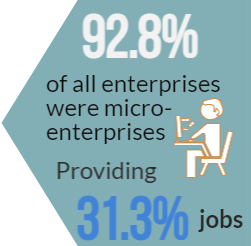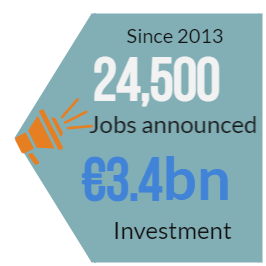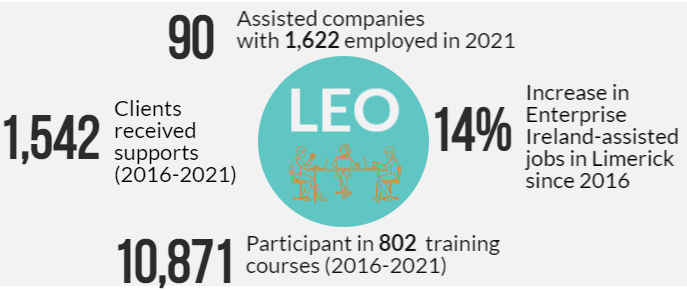2.12 Enterprise
Limerick has been performing well in enterprise growth and job creation. New enterprise start-up, enterprise expansion in the Foreign Direct Investment (FDI) and indigenous business sectors are important objectives to build resilience and sustained job creation.
Business Activity and Jobs Located in Limerick
The CSO’s Business Demography series[1] shows that the number of active enterprises located in Limerick was 9,497[2] in 2020 (the most recent data). The number of active enterprises in Limerick has ranged from approximately 8,900 to 9,500 over the years since 2008.
 The number of persons engaged (owner-managers and employees) in businesses located in Limerick has fluctuated with the economic cycle. In the years of the Great Recession (2008 to 2012), the number of persons engaged dropped by over 15,000 (-25%). Employment in enterprises has been recovering consistently since 2013. The highest number of persons engaged was recorded in 2019 (50,632) but this reduced to 42,943 in 2020. The drop in the number of persons engaged in 2020 is linked to contraction of economic activity due to COVID-19, although enterprises and employees were sustained with the financial support (COVID payments) from government.
The number of persons engaged (owner-managers and employees) in businesses located in Limerick has fluctuated with the economic cycle. In the years of the Great Recession (2008 to 2012), the number of persons engaged dropped by over 15,000 (-25%). Employment in enterprises has been recovering consistently since 2013. The highest number of persons engaged was recorded in 2019 (50,632) but this reduced to 42,943 in 2020. The drop in the number of persons engaged in 2020 is linked to contraction of economic activity due to COVID-19, although enterprises and employees were sustained with the financial support (COVID payments) from government.
Enterprise Size-structure: SMEs and Large Enterprise
Analysis of latest data (2019 and 2020) shows the importance of micro- and small enterprises in the local economy of Limerick City and County. In 2020, 92.8% of all active enterprises in Limerick and 31.3% of all jobs in those enterprises were in micro-enterprises (less than 10 person engaged). Large enterprises (250 persons engaged) accounted for only 0.15% of enterprises in 2020. However, large enterprises account for over one-fifth (21.5%) of jobs in Limerick-based enterprises.
Sectoral Profile of Businesses Located in Limerick
Analysis of the sectoral profile of employment in enterprises in Limerick shows the importance of manufacturing, accounting for 19.7% of persons engaged in 2020. There has been a growth in employment in construction (10.7% of persons engaged in 2020 compared with 9.5% in 2019). Service sector employment accounts for ov er half of all employment in private businesses located in Limerick (50.2% in 2020) and this has been the case since 2012. Employment in services cuts across different skills levels (advanced business services, wholesale and retail trade and repair of motor vehicles, accommodation and food services). In 2020, wholesale, retail and repair of motor vehicles had 10,146 persons engaged (17.9%) and food and accommodation services 6,046 persons engaged (10.7%). If additional services categories are included in the analysis (Human Health & Social Work Activities and Other Services), some 63% of employment in private businesses in Limerick is in services plus an additional 1% in Financial Services.
er half of all employment in private businesses located in Limerick (50.2% in 2020) and this has been the case since 2012. Employment in services cuts across different skills levels (advanced business services, wholesale and retail trade and repair of motor vehicles, accommodation and food services). In 2020, wholesale, retail and repair of motor vehicles had 10,146 persons engaged (17.9%) and food and accommodation services 6,046 persons engaged (10.7%). If additional services categories are included in the analysis (Human Health & Social Work Activities and Other Services), some 63% of employment in private businesses in Limerick is in services plus an additional 1% in Financial Services.
Investment and Job Creation: Foreign Direct Investment (FDI)
 Between 2013 and April 2022, over 24,500 jobs have been announced for Limerick. These came from companies including Johnson & Johnson, Regeneron, Edwards Lifesciences, Legato Health Technologies, Northern Trust, Bon Secours and Nordic Aviation Capital. More than €3.4 billion of investment has been announced by companies including Eli Lilly, Takumi, Shannon Foynes Port Company, Becton Dickenson and Pallas Foods. The predominant sectors for job announcements, and employment growth, include biopharma, medical devices, ICT, construction, retail, fintech and the creative sector.[3]
Between 2013 and April 2022, over 24,500 jobs have been announced for Limerick. These came from companies including Johnson & Johnson, Regeneron, Edwards Lifesciences, Legato Health Technologies, Northern Trust, Bon Secours and Nordic Aviation Capital. More than €3.4 billion of investment has been announced by companies including Eli Lilly, Takumi, Shannon Foynes Port Company, Becton Dickenson and Pallas Foods. The predominant sectors for job announcements, and employment growth, include biopharma, medical devices, ICT, construction, retail, fintech and the creative sector.[3]
The FDI performance in Limerick has been consistent over the past five years with employment among IDA client companies increasing considerably, by 40.5% since 2016. The most important sector for FDI investment in Limerick is ICT/Hardware/Software, followed by Engineering and Medical Technology. Biopharmaceuticals, Business Services, Financial Services and Consumer Goods also feature. While Limerick does not enjoy the same degree of sectoral FDI clustering as Cork and Galway, it has the advantage of a wide range of sectors - a characteristic which improves resilience to sectoral downturns. Over the next few years, further opportunities in ICT can be built upon, especially as technology increasingly permeates other sectors, such as life sciences, pharma, MedTech and agri-tech.
Indigenous Enterprise Sector
Enterprise Ireland-assisted jobs in Limerick have increased by 14% since 2016. The number of clients that received support from the Limerick Local Enterprise Office (LEO) increased substantially in 2020 to 1,091, due to COVID, with 90 companies assisted in 2021. However, the numbers employed in Limerick Local Enterprise Office (LEO)-assisted companies declined by 22.4% from 2,091 in 2016 to 1,622 in 2021, which highlights the impact of the COVID-19 pandemic.

[1] CSO Business Demography. https://www.cso.ie/en/statistics/enterprisestatistics/businessdemography/
[2] This number relates to enterprises classified under the NACE Codes B-N and excludes the service categories Education (P), Human Health & Social Work Activities (Q), Arts, Entertainment and Recreation (R) and Other Services (S). If all of these categories are included, the number of active enterprises located in Limerick is 12,346 and the number of persons engaged is 69,179.
[3] Data from LCCC Economic Development Directorate / Forward Planning